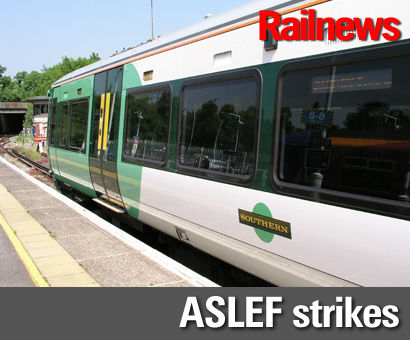THE RMT has called a strike of its driver members on Southern to coincide with three days of walkouts announced by ASLEF.
The action by ASLEF is in pursuit of a pay claim, and the union has rejected an offer from Southern which would reportedly take a driver’s basic pay from £49,001 to £60,683 for the existing 35-hour, four-day week. It amounts to an increase of 23.8 per cent over four years.
But ASLEF members voted in favour of walkouts, with 61.8 per cent supporting strikes -- a decision which Govia Thameslink Railway described as ‘breathtaking’.
ASLEF has named three strike days in the first week of August, on the 1st, 2nd and 4th of the month. The RMT now says its Southern drivers will take the same action, although it is believed that only a few drivers on Southern belong to the RMT.
Mick Whelan, the general secretary of ASLEF, said: “Now is the time for Chris Grayling and the Department for Transport to step in and assist in finding a resolution to a problem they caused.”
ASLEF members on Southern are already taking part in an indefinite ban on overtime and rest day working in the separate dispute over the introduction of driver-controlled operation, which the union claims has been done ‘without negotiation’, and which is reducing train services on many Southern routes and also Gatwick Express.
The RMT is also in dispute with Govia Thameslink Railway over DCO. RMT general secretary Mick Cash said: “Yet again today RMT is forced to send Southern Rail a clear message that we will not allow them to strip the railway of a safety critical second member of staff on these vital rail services.
“We have seen again this week the Government propping up the failed Southern Rail operation as they collude with the company to undermine the fundamental principles of safety and access. It is scandalous that neither Chris Grayling nor his contractors, GTR, have lifted a finger to get talks back on despite approaches from the union. This fiasco cannot be allowed to drag on any longer.”
A spokesman for Govia Thameslink Railway said: “To call three days of strikes spread across a week is a deliberate move to cause maximum disruption for passengers. To do so in protest against an offer to increase pay by 24 per cent is simply breathtaking. Commuters, the vast majority of whom are seeing pay rises many times less, will understandably be as shocked and frustrated as we are.
"We absolutely need to modernise in order to increase capacity on this, the most congested part of the UK's network, where passenger numbers have doubled in places in as little as 12 years. That requires modernisation of infrastructure, trains and working practices. The trade unions must join us in that endeavour."


